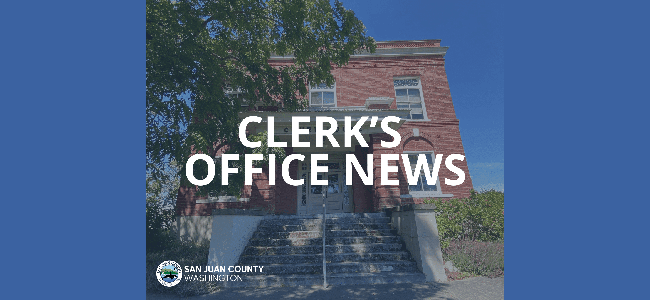||| FROM THE OFFICE OF REP. DEBRA LEKANOFF |||
It’s time to rebalance & modernize our tax code – come find out how!
Washington state’s tax structure places a heavier burden on working families and small businesses than those at the very top of the income bracket and relies on sales, property, and other excise taxes to fund schools, public health, and other vital services. It’s fundamentally inequitable, but there are ways to change it.
Over the past two years, the Tax Structure Work Group has conducted robust economic analysis and held initial listening sessions to find out how the Legislature can create a more equitable, transparent, and stable tax code for working families and small businesses. Now, the work group is inviting taxpayers to explore several scenarios to change the state’s tax structure and all members of the public are invited to weigh in!
The Tax Structure Work Group is hosting seven virtual Tax Town Halls, one for each of seven regions in Washington. Each Town Hall will offer two identical sessions, one in the afternoon (2:30 – 4:00 p.m.) and one in the evening (6:30 – 8:00 p.m.).
These Tax Town Halls will be 90 minute interactive listening and sharing sessions, so we invite you to come prepared to share your thoughts with your neighbors, local businesses, elected officials, and extended community. All taxpayers are welcome – you don’t need to be an accountant or tax expert to participate! The sessions will be conducted remotely on Zoom – if you have any questions or accessibility concerns please contact info@taxworkgroup.org.
All residents and businesses of Washington state are welcome to join and provide feedback. Help us reach more Washington taxpayers and businesses by sharing this information with your friends, families, and neighbors!
Click the map to find your region and sign up.
Our 40th District falls within the Northwest Region, so be sure to join us for the virtual Tax Town Hall on October 6. I’ll be listening to you as you weigh in on the scenarios presented and am interested in knowing how you think the state can better provide vital state services like schools and public health through an improved tax code.
You can register for the town hall on October 6 online at taxworkgroup.org or via the Northwest Tax Town Hall Facebook event. I hope to see you there!
Click to register for the afternoon or evening session.
Weigh in on Washington State’s Redistricting

With the completion of the Census last year, every state is now completing its redistricting process. Every ten years, we change the boundaries of our legislative and congressional districts to ensure that they represent a roughly equal number of voters. Next Tuesday, September 21, at noon, the Redistricting Commission is releasing four draft maps. Each member of the redistricting commission (one per Caucus from both the House and Senate) will be introducing their own map. Now is our chance to give our feedback and help shape the legislative and congressional districts for the next ten years. On Tuesday, you’ll be able to view the maps and provide feedback on the Redistricting Commission’s website. You can also register to provide public comment during the upcoming Outreach Meetings for the proposed legislative and congressional maps on October 5 and 9 respectively. To learn more about the redistricting process and why it is so important that you weigh in on the process, check out this interview with my colleague, Rep. Marcus Riccelli and the House Democrats’ Redistricting Commission appointee April Sims. |
Busting COVID-19 Vaccine Myths

Are you or some of your loved ones still hesitant about getting the COVID-19 vaccine? There is a lot of information out there and it can be overwhelming. Join Washington community and scientific leaders, and the Washington State Department of Health, for straight talk answers to your questions. They will address the facts about COVID-19 and the vaccine, share tips for speaking with loved ones who are still hesitant to get it, and discuss how to seek and share accurate information to prevent further misinformation from spreading. Join the panel of experts on September 23rd at 5 p.m. Submit your questions and register for the free webinar. |
WA Cares Fund: Answering your Questions
The WA Cares Fund is the next step in social safety programs that make long-term care affordable for you and your family. Workers contribute about 58 cents for every $100 earned and, when vested, can access the benefit. It is a lot like Social Security—everyone pays so that everyone who needs this benefit can access it.
Washington is the first state in the nation to develop a way to make long-term care affordable for all workers as we age. Click here or on the image below to learn about the Washington Cares Fund in a 2-minute video.
Click to learn more about the WA Cares Fund.
Unfortunately, there has been a lot of misinformation and confusion about the program, so I am including this section in my newsletter to answer some of your questions.
Why do we need the WA Cares Fund?
The Fund was created to address an alarming gap in long-term care coverage. Before this summer, less than 10 percent of Washingtonians had private long-term care policies. Medicare does not cover long-term care, which forces people to spend down their life savings to qualify for Medicaid. Medicaid long-term services and supports represent 6.3 percent of the state budget and will continue to grow as our population ages. We all pay for these services now through regressive taxes like the sales tax.
The WA Cares Fund addresses this issue by ensuring families have affordable care to help their loved ones eat, bathe, dress, and manage their daily lives. WA Cares will help families with these costs without having to spend down their savings to receive Medicaid-funded services.
How does WA Cares compare to private long-term care coverage?
WA Cares is a first-in-the-nation program meant to provide working families more security as they and their loved ones age. It is not meant to replace commercial long-term care coverage but to give families alternatives to spending down their assets to qualify for Medicaid.
Commercial long-term care coverage is also expensive, restrictive an
Unlike commercial coverage, yo
And unlike commercial policies, WA Cares gives you flexible options and won’t deny coverage for pre-existing conditions. Commercial insurance often charges women 50 percent more than men. WA Cares costs the same for everyone.
Why make WA Cares mandatory?
WA Cares is intended to provide everyone with a long-term care benefit. Because some people purchased private long-term care policies before WA Cares was created and that coverage could be duplicative, the law allowed them a one-time opt out. The option to opt out was never intended to be a “loophole” to get out of participating in the plan, because it’s important that we all contribute to the long-term care system. Like Social Security or Medicare, if people opted out, no one would have those safety nets available.
Long-term care is expensive, isn’t covered by Medicare, and most families lack enough savings to pay for it. WA Cares is the next big step in our social safety net to ensure that Washingtonians can access benefits when they are needed, helping us create stable, healthier communities.
The maximum benefit isn’t enough for full-time long-term care, so what can I use it for?
WA Cares covers a range of services that help with personal care in your home, home-delivered meals, home modifications to accommodate wheelchairs, transportation, training for family members, and more. The idea is to help our loved ones age in their homes, not place them in expensive long-term care facilities that may not be right for them.
What if I move out of Washington state?
Right now, you must live in Washington state to collect a WA Cares benefit. That may change over time. But if you choose to purchase a private policy and opt out of WA Cares, that choice is permanent and can’t be changed. For most Washington residents, WA Cares is the best value for the benefits they will receive. There is a specific long-term care workgroup that is considering policy options to address this issue. We still encourage everyone to participate, because contributing now keeps your options open in the future.
What if I live in another state but work for a Washington employer?
Right now, people who work in Washington but live out of state would not be able to access WA Cares benefits. Similar to programs like Medicaid and Social Security, contributions are collected by your employer. And like other social safety net programs, the goal is to provide Washingtonians the benefits they need and bring stability to communities. While some
What if I am approaching retirement in the next 10 years?
In order to vest with and receive WA Cares benefits, you must contribute to the program for at least ten years at any point in your life without a break of five or more years, or three of the last six years, and work at least 500 hours per year during those years. That contribution is about half a percent or 58 cents for every $100 earned. For some, the timeline for vesting may conflict with retirement. We are interested in hearing from you if you are in this situation. Our specific long-term care workgroup is also considering policy options to address this issue.
Where can I get more information?
Visit www.wacaresfund.wa.gov. You can join the mailing list for updates or sign up for a live informational webinar.
Thank you all for taking to the time to read this week’s Fantastic Friday, and for taking an interest in our progress at the House of Representatives. While we are in the interim, I will be sending out an official Fantastic Friday twice a month, with two weeks on and two weeks off.
Please feel free to reach out to me using the information below, with any questions, inquiries, or concerns you may have.
I am here for you!
**If you are reading theOrcasonian for free, thank your fellow islanders. If you would like to support theOrcasonian CLICK HERE to set your modestly-priced, voluntary subscription. Otherwise, no worries; we’re happy to share with you.**












How about an update on the ferry system’s problems and what you are doing to help? Your San Juan County constituents are suffering.
The WA Cares Act is a poorly constructed effort and overreach and the slick sales job to correct “misinformation “ does not correct the significant flaws. There is no way people should pay into this with no hope of vesting and no reason it shouldn’t be transportable out of state. – the “we’re looking at solutions “ tells me they didn’t design this correctly in the first place.